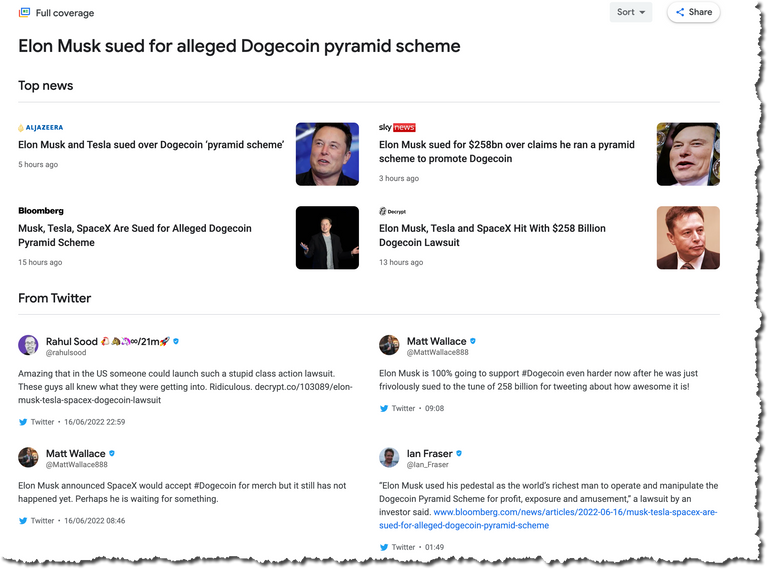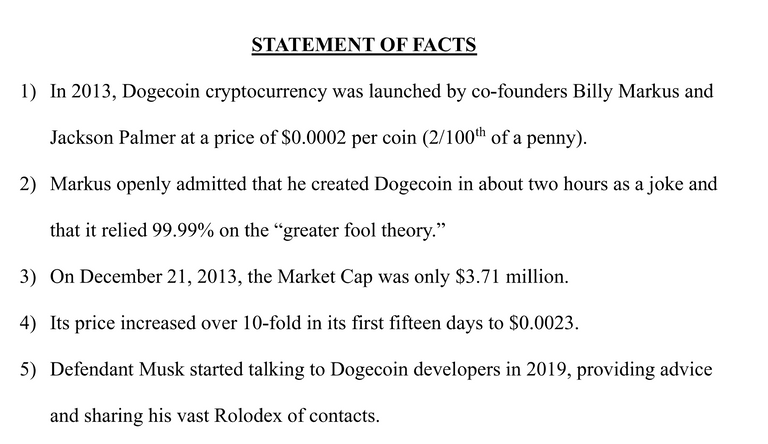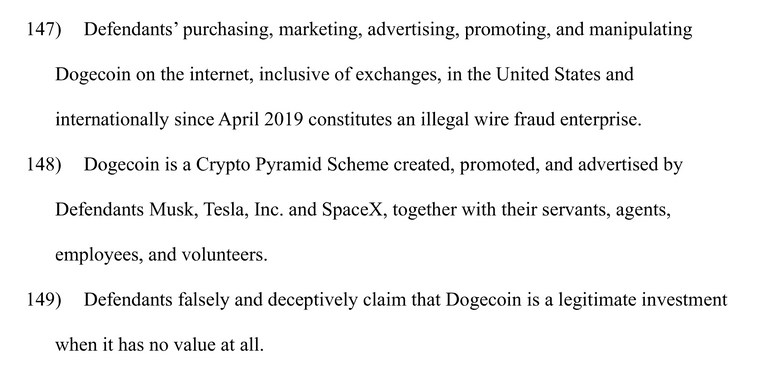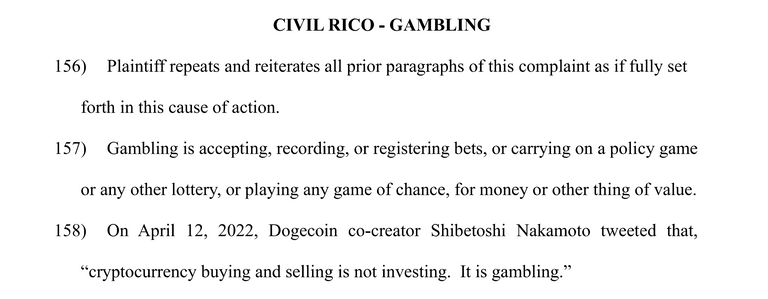
Just look at those headlines. Look at them. And they generated a ton of tweets and noise.
The case itself is just a list of times Elon Musk tweeted about Doge. Doge is quite clearly a joke that got way out of hand and it probably did make the founders very rich. The case clearly states that Elon didn't found Doge, that happened in 2013 and their first allegation about Musk is in 2019.

From then on every single joke, tweet and especially appearance on a SATIRICAL HUMOUR TV Show "Saturday Night Live" is taken as a literal endorsement and a command to "buy DOGECOIN" by the hapless plaintiff in this case. The Saturday Night Live appearance is critical to the "case" because it puts Elon Musk in New York and stands as the only reason why New York's courts can have jurisdiction over this!
But when it gets to this next passage, how can this be read against the Statement of Facts?

This directly alleges that Elon Musk "created, promotoed and advertised" Dogecoin.
And then there's this which uses the meme name "Shibetoshi Nakamoto" of one of the founders, despite the fact that the case's statement of facts clearly uses two real names (neither of which are Elon Musk).

My point of talking about this is not to say the case won't get thrown out in a New York minute, but it is to point out how the MEDIA treat nonsense like this. Look at this breathless coverage without any of the "journalists" doing enough of a critical deep dive to know that this case is nonsense.
The American system makes it virtually impossible for Elon to reclaim the costs he'll incur swatting this down. It won't cost him anything more than loose change he'll find down the back of the sofa on his private jet, but that's not the case for everyone.
In contrast, @apshamilton's case in Australia against Meta Facebook and Google, at the point where they are served, puts Andrew on the line for Facebook and Google's legal costs to defend themselves. There is a specific provision of the specific law in that case which allows us to ask that we NOT be liable for the other side's costs (see Section 82 at the end of this post) but that isn't decided until AFTER the case is served on the other side.
It turns out we're not looking for more press noise about our Crypto Class Action right now, it probably doesn't help us. When you actually have a solid case in law, you don't need to scream and shout and have Bloomberg run pieces for you. If and when we need to make a noise and if it helps our case, we will.
This video is a pretty good breakdown and highlighted the points I made above and more.
The case:
https://storage.courtlistener.com/recap/gov.uscourts.nysd.581639/gov.uscourts.nysd.581639.1.0.pdf
From the @JPBLiberty #CryptoClassAction case and taken from this post: What are the actual provisions of law in Australia which we use in our case against Facebook and Google?
No adverse costs orders - Section 82 (3) - (7) of Act
This section is important for the way in which we are fighting this case.
Australia's legal system, rather differently to the USA, relies on the threat of "adverse costs" to deter frivolous law suits. If you bring a lawsuit in Australia and lose, you are likely to have to pay the legal costs of the other side.
For this reason, for a long time, we were working under the assumption we would have to raise many millions of dollars to both employ a high level legal firm in Australia and to put up a "security for costs" bond, which could itself run to many millions of dollars.
However, a little over 12 months ago, new provisions entitled "No adverse costs orders" were added to section 82 of the Act (which is the provision allowing civil claims damages for breaches of the Act).
Essentially what this means is for the specific part of the Act we're suing under, anti-competitive practices, we can ask the Court to order that we won't have to pay Facebook and Google's legal bills, even if we lose!
This is HUGE for us.
It means we won't need to find many millions of dollars for expensive external lawyers and a security for costs bond and won't have to risk bankruptcy to bring this important case.
We'll need to show a few things such as a prima facie case, that an issue in the case is significant to other people and that there is a "disparity between the financial position" of ourselves and the combined balance sheets of Facebook and Google, which, unless either of us lost $500bn down the back of the sofa, shouldn't be hard.
We are also breaking new legal ground with this application: in the short time this provision has been on the books, we're not aware that anyone has applied for such an order.
SECT 82 Actions for damages
Actions for damages
(1) A person who suffers loss or damage by conduct of another person that was done in contravention of:
(a) a provision of Part IV or IVB; or
may recover the amount of the loss or damage by action against that other person or against any person involved in the contravention.
(2) An action under subsection (1) may be commenced at any time within 6 years after the day on which the cause of action that relates to the conduct accrued.
No adverse costs orders
(3) A person who brings an action under subsection (1) in relation to a contravention of a provision of Part IV may at any time during proceedings on the matter seek an order under subsection (4) from the court hearing, or that will hear, the matter.
(4) The court may order that the applicant is not liable for the costs of any respondent to the proceedings, regardless of the outcome or likely outcome of the proceedings.
(5) The court may only make an order under subsection (4) if the court is satisfied that:
(a) the action raises a reasonable issue for trial; and
(b) the action raises an issue that is not only significant for the applicant, but may also be significant for other persons or groups of persons; and
(c) the disparity between the financial position of the applicant and the financial position of the respondent or respondents is such that the possibility of a costs order that does not favour the applicant might deter the applicant from pursuing the action.
(6) The court may satisfy itself of the matters in subsection (5) by having regard only to the documents filed with the court in the proceedings.
(7) A person who appeals a decision of the court under subsection (4) is liable for any costs in relation to the appeal.
Support Proposal 222 on PeakD
Support Proposal 222 with Hivesigner
Support Proposal 222 on Ecency

- Vote for APSHamilton's Witness KeyChain or HiveSigner
- Vote for APSHamilton's Witness direct with HiveSigner
- Get Brave
- Use my referral link for crypto.com to sign up and we both get $25 USD
- Sign up for BlockFi
- Find my videos on 3speak
- Join the JPBLiberty Class Action law suit
- Verify my ID and Send me a direct message on Keybase

